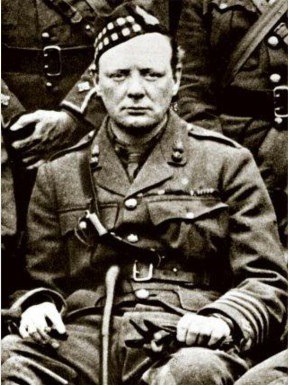Decades later, American writer Phillip Dick postulated an interesting alternate history scenario in his book Man in the High Castle, where Churchill didn't give up his seat in the House of Commons, and returned to the UK a few months later to sit in and speak after his brief sortie in the front line. In this scenario, Churchill would have been the one lone voice of opposition to the rise of the Nazi Party in Germany lead by Adolf Hitler, and would have pushed the UK government to confront him, increase the military, and end appeasement. The start of the war in May of 1939, when Poland was overrun and England and France watched and did nothing, would have been viciously attacked by Churchill, and when Hitler invaded the Low Countries and France in surprise, though they were neutral, the UK finally went to war. However, the British army was in no shape to send troops to France, and the nation fell in six weeks. Prime Minister Neville Chamberlain, was disposed from office, and, this was the big change, instead of Lord Halifax being named Prime Minister, Winston Churchill was selected instead.
Churchill, using his sharp tongue, his flair for the dramatic, and his strategic mindset that only failed him at Gallipoli, would organize the British to stand up to Nazi Germany, instead of meekly rolling over and signing the "Pact of Berlin" in 1941, where the Nazis and Britain didn't interfere with each other's empires, and would not have ended up fighting. Instead, Churchill leads Britain in a long, bloody war with Nazi Germany that for three years was mostly fought on the oceans and air. However, by this point the Germans were strong enough to invade England itself, and in a long, brutal Battle of Britain, Churchill is forced to a mountain redoubt in Scotland (making him the so-called "Man in the High Castle") where he continued to fight the Nazi's as they fully occupied England. Unfortunately, the story ends at this point, and the promised sequel never came.
It was an interesting bit of alternate history, but many dismissed the plot as nothing short of incredulous, considering how the Third Reich currently dominates most of Europe, and the weakness of the leaders of Britain since the rise of the superior Nazi's. The fact that the British Empire hasn't been fully taken over is seen as Hitler's fondness of their history and empire, despite their weakness and political infighting over the past two decades. The thought that one man could have convinced the British to fight the Nazi's still seems rather implausible, even if you went back in time.
-Book Review, Man in the High Castle, 1984.
This scenario is taken from a suggestion made by James McGregor on Facebook! Thank you!
But what do you think? How different would a world without Winston Churchill really be? Or if you have a topic or idea you would like me to talk about, please leave comments below, email me at tbguy1992@gmail.com, or tell me on Twitter @tbguy1992.
But what do you think? How different would a world without Winston Churchill really be? Or if you have a topic or idea you would like me to talk about, please leave comments below, email me at tbguy1992@gmail.com, or tell me on Twitter @tbguy1992.

No comments:
Post a Comment